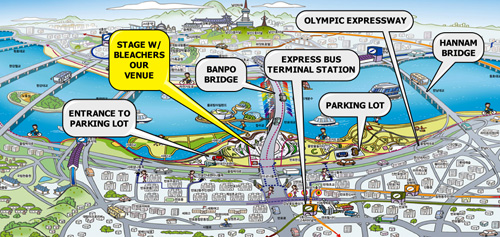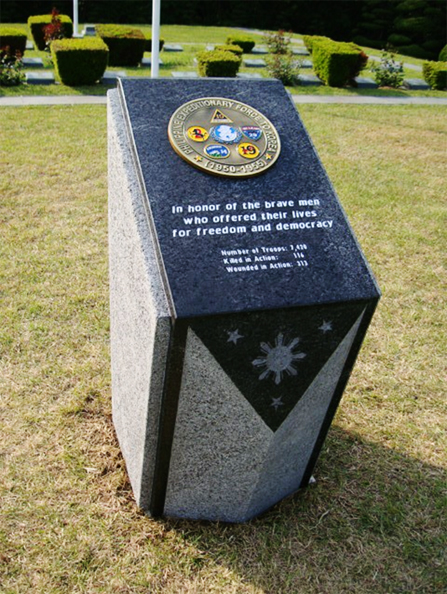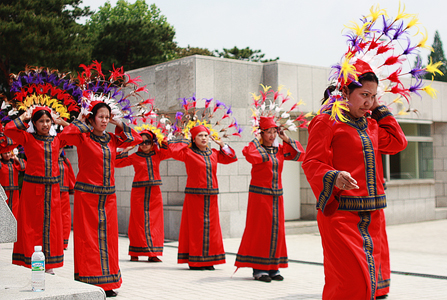


| • HOME › 60TH ANNIVERSARY CONRNER |
Major Activities for the 60th Anniversary of
Philippines-Korea Relations
Under Proclamation No. 1495 dated 17 May 2008, Philippine President Gloria Macapagal Arroyo announced March 3, 2009 as “Philippines-Korea Friendship Day” and the year 2009 as “Philippines-Korea Friendship Year.” Commemorative activities both in the Philippines and South Korea will celebrate six decades of close partnership, raise mutual awareness among each other’s peoples and toast to the future of Philippines-Korea relations.
“Nurturing A Meaningful Friendship” aptly summarizes the 60 years of collaborative and fruitful relations that both countries enjoy while looking forward to a future defined by even closer ties and stronger cooperation.
Important Reminders
111th Philippine Independence Day
14th Migrant Workers Day
60th Anniversary of Philippines-Korea Bilateral Relations
05 July 2009
- Proceed to Banpo Park early to provide allowance for time to locate the area (the Park is relatively new)
- Upon arrival at Banpo Park, FilCom heads/representatives are requested to report to the Philippine Embassy tent/booth for registration of their group
- Bring hat, raincoat, umbrella or any accessory which you may deem appropriate to shield you from sunlight or rainfall
- FilCom participants (except performers and volunteers) are expected to bring their own food and water. You can bring picnic mats.
- Cooking is not allowed in the park.
- Selling foods and other commercial items is prohibited
- Do not leave children and personal belongings unattended
- Do not damage or write on any structure in the Park
- VERY IMPORTANT : Put your garbage in plastic bags to be provided by the Embassy then leave the bags in designated collection areas; otherwise, we will be fined and barred from using the park in the future

|
|

The marker pays tribute to these proud and brave Filipino soldiers, 116 of whom sacrificed their lives in order for freedom to reign over South Korea. They heeded the call of duty, stood side by side with their South Korean brothers during a time of need, and forever etched their name in history.
The UNMCK was built in 1951 to provide a resting place for fallen soldiers of the UN Command, which dispatched thousands of soldiers and support teams to help South Korea defend itself from the surprise invasion of the communist North on June 25, 1950. The Philippines was among the 16 nations which provided combat troops.
The UNMCK allotted a plot for Filipino casualties but, since they were all buried in the Philippines, the land has long been empty except for a pole flying the Philippine flag.
“We unveil this marker to guarantee that the stories of our soldiers, the chasms they crossed and the victories they helped materialize, will continue to provide a beacon of learning and inspiration for generations to come,” said Philippine Ambassador Luis T. Cruz in a speech he delivered during the unveiling ceremony.
The Philippine Department of Defense (DND) was instrumental in erecting the marker in Busan, which was the site of the landing of the first Philippine battalion under the Philippine Expeditionary Force to Korea (PEFTOK) on September 19, 1950.
The unveiling ceremony was witnessed by some 60 PEFTOK veterans and their families who are in South Korea from May 27 to June 1 for the annual Revisit Program sponsored by the Ministry of Patriots and Veterans Affairs.
DND Undersecretary for Civil, Veterans and Reserve Affairs Gen. Ernesto Carolina, who was with the group, reaffirmed the commitment of the Philippines in ensuring the welfare of the veterans and promoting awareness about their role in securing peace and stability in the region.
The Philippine Embassy, through the Office of Defense and Armed Forces Attache, coordinated with the Ministry to move the schedule of the Revisit Program from September to May to coincide with the unveiling ceremony.

Enlisting the local Filipino Community to showcase six of the most popular street festivals in the Philippines, the Philippine Embassy in Seoul will hold a series of activities at the recently opened Banpo Park on July 5 to celebrate the 111th Philippine Independence Day, the 14th Filipino Migrant Workers Day and the 60th Anniversary of Philippines-Korea Bilateral Relations.
“Lively festivals, with their energetic and costumed street dances, are key tourist attractions in the Philippines,” said Philippine Ambassador to Seoul Luis T. Cruz. “This year, we will bring these festivals to South Korea to give the public a glimpse of the vibrant history, society and culture of the Philippines in hopes of further promoting mutual understanding between our nations and strengthening people-to-people exchange,” he added.
The featured events will include the Panagbenga, a festival of flowers; Sinulog, Ati-atihan and Flores de Mayo, religious festivals that underline the importance of Christianity in the Philippines; Masskarra, a parade of masks; and Kadayawan, a popular thanksgiving festival in Southern Philippines.
Approximately 300 members of the Filipino Community from all over South Korea have volunteered to take part in the street dances, training for?two months under professional instructors sent by the Philippine National Commission for Culture and the Arts.
The street dances will begin at 1:30PM and last for about one and a half hours. A mass for the Filipino Community will open the festivities in the morning while a brief recognition ceremony for Korean individuals and organizations that actively help Filipino workers will take place after the parade of festivals.
The daylong program will also include labor counseling services by the Korea Ministry of Labor, a concert by Filipino bands based in South Korea, and free tests and basic medical services by the Seoul National University Hospital.
The celebration comes after the successful state visit of Philippine President Gloria Macapagal-Arroyo in Seoul on May 30, 2009, at the heels of the ASEAN-Korea Commemorative Summit in Jeju on June 1-2. Pres. Arroyo and Pres. Lee Myung-bak have agreed to intensify and broaden cooperation as both countries celebrate the 60th anniversary of diplomatic relations between the Philippines and South Korea, which were established on March 3, 1949.
The Philippine National Day is celebrated every year on June 12 and the Philippine Migrant Workers Day, an annual celebration in honor of Filipinos working abroad, in the month of June.
Other organizations that provided support for the festivities on July 5 include the Human Resources Development Corporation, Korea Exchange Bank, Landbank of the Philippines, Metropolitan Bank and Trust Company, Western Union and Woori Bank. The celebration is open to the public.




